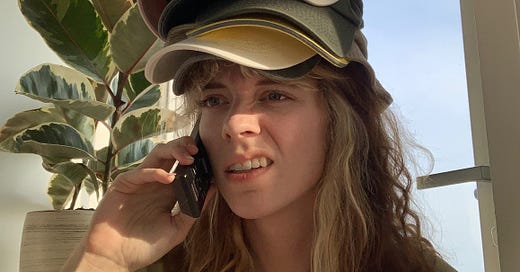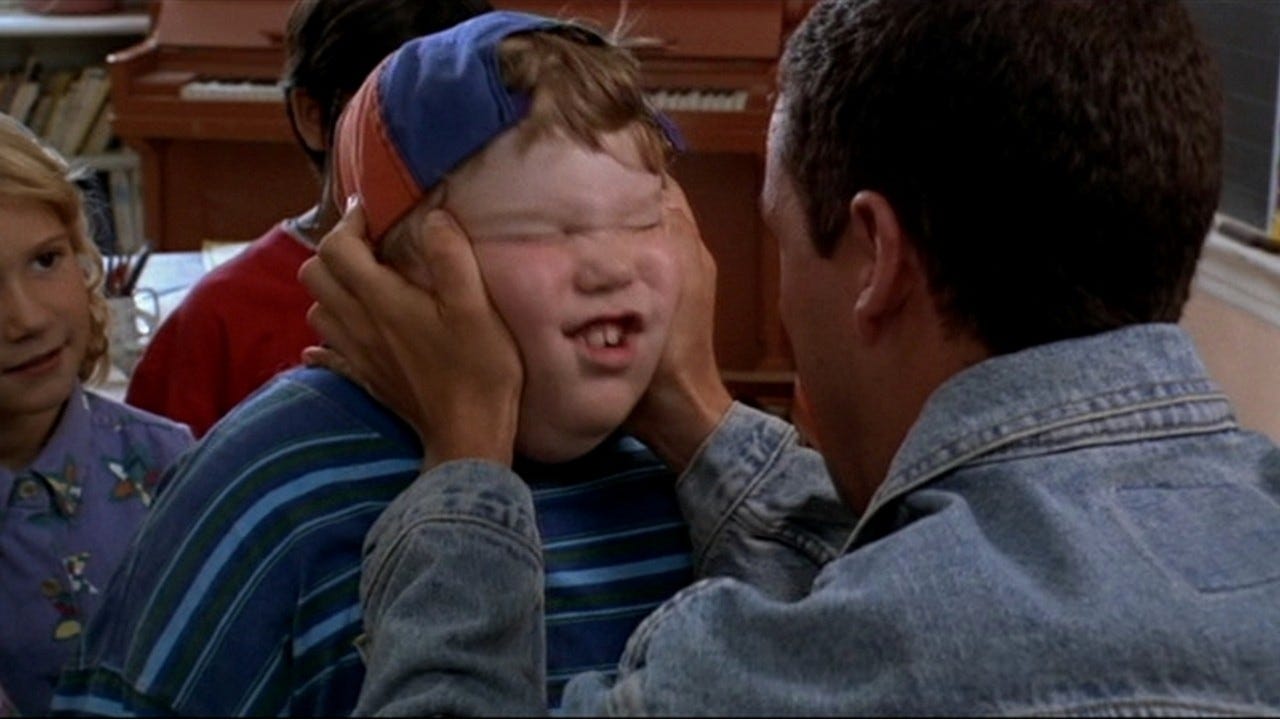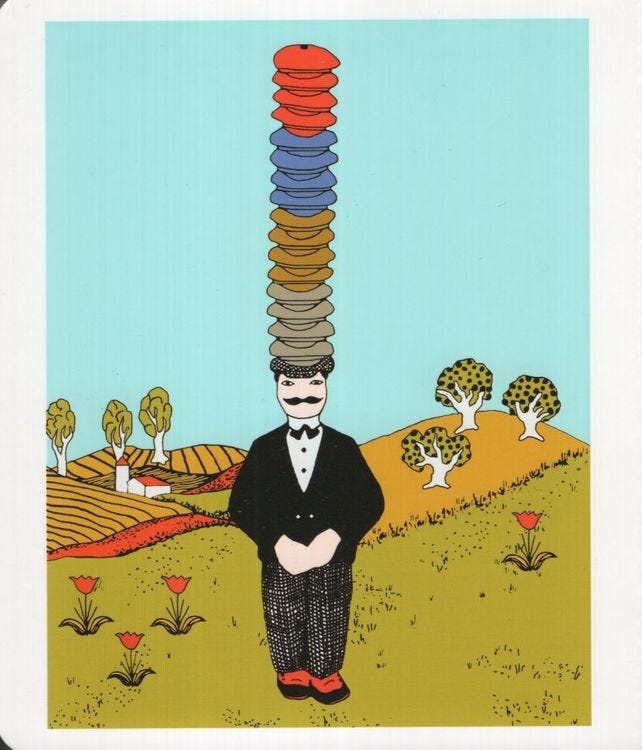A Glass House and Unstoppable Stones
And how to make peace with rejection, because it’s not rejection.
Before I dig into the fun complexities of a hyper-saturated music market, I want to emphasize that the purpose of this essay is not to discourage anyone from pitching their music or shooting their shot. It’s a recommendation to pitch effectively and with kindness, because the struggles of independent artists and record labels overlap. There’s a human on each end of communication, and we’re all shouting something into the void at any given time. I’ll end the essay with what I think makes a strong and courteous pitch.
Music makers, industry workers, I think of us all collectively as one big amoeba who are combatting an unfair industry that’s drenched in capitalist conundrums. Everything is the void. Financial and livable success in the music business was “risky” in the 80s. Now it’s nearly impossible. Remember who you are, remember what you’re up against, and if making music has lost its joy, just know that it will come back. We can’t help but make music, it’s how we process the world and express ourselves. The industry can’t change that fact no matter what state it’s in. And I reckon it will be in many different, confusing “states” in our lifetime.
It may go without saying, but I work in music because I am a music lover. If I wasn’t, I would not put up with the bullshit of this corrupt industry. If you worked in music (or devote your life to music) before the pandemic and still work in music today, I smile and salute you. You are a real one. I love running a record label, I never once imagined that my passion for good riffs and brave open-hearted artists would modestly sustain my life and I’m grateful every day that it does.
Committing my life to a record label, especially in NYC, came at a cost — the line between my personal identity and my professional identity quickly began to fade. I recognized that I needed to find routines to separate my music business brain from my music pleasure brain, and most importantly my music-making brain. Writing and demoing music is a tool that’s imperative to my happiness and survival. I started to feel guilty revisiting nostalgic releases or comfort music while a massive list of pitches and unreleased music requiring my attention loomed over me. But I’ve shed that guilt over time, because if you can find anything that makes you giddy or helps you remember why you love music or work in music, keep that.
The moments I spend alone in my room yodeling along to Shania Twain or shuffling to the B-52s are directly related to my ability to work through the trenches of the music industry. It’s music as passion, music as a feeling, music as joy, uninterrupted. Never feel guilty about sinking deep back into the love of music that brought you into this sticky industry in the first place. Alternatively, take full-on breaks from music. Spend a week watching movies or reading books, give yourself a cleanse and some perspective. In the handful of times I’ve achieved this, I start writing more and it becomes instantly clear to me how integral music is for my survival.
Double Double Whammy is a community label run by two people. In short, we wear a lot of hats. But we compete directly with labels with 10, 15, 100+ employees. And those people wear a lot of hats too. Music is not profitable enough for record labels to build “departments” in a couple of years. It can be done, but it’s often slow work, it can take decades to have a full-on “staff.” In the same way that every indie musician has another job to make a living, labels and their employees are devoting a lot of their time and energy into something that breeds little financial success. I am not someone in a massive office that you hope will come to your show and check your band out. I’m playing the shows with you and I’m not making any money either.
Both artists and labels are operating in laborious “DIY” style in 2023. Though the word “DIY” has taken on many meanings and cultures — its ethos is always relevant. A statement about DIY in Jim Ruland’s book “Corporate Rock Sucks” has stuck with me:
“Those who choose this path eventually discovered that the satisfaction one took in doing the work is the only reliable reward.”
This was true decades ago and it’s true now. If patience is not your strong suit and the occasional small fruits of your labor aren’t enough to sustain you, you will suffer. Touring, engaging with fans, checking emails, sending DMs, recording, approving mixes and artwork, coordinating a band practice — record labels can’t do that stuff for an artist. We’re doing all the weird behind the scenes admin work that shouldn’t fall on the artist. Setting ambitious goals and realistic standards are of equal importance to me when planning an album campaign. Artists making a living off of their labor is the ultimate goal, but it’s common for this goal to be met when an artist is on their fourth or fifth album. And finding a way to make a living while also devoting yourself to a consistent output of music takes many years.
If you’re planning to pitch your music and aren’t sure where to begin, think about 5 artists that you admire and study their career arc. When was their first release? At what point in their career did things shift? Why do you still admire them after so long? Then lastly, factor in where the industry is at the moment and consider what musical “success” means to you.
Industrializing your music has swells, dives, and currents, so build a strong ass boat. That boat will be rocking and you will deserve a luxurious airdrop of supplies to sustain yourself, but for a long time it may just be a bruised banana and some sour cherries. Like Ruland said, the satisfaction of your work is the only reliable reward. It’s not the only reward, but it may be the sole reward for a long time.
Here’s where it gets personal and why the shared struggles are relevant to pitching. There have been intense social cons to working in the music industry, especially being mixed up in the “A&R” side of things. Music thrives in NYC more than anywhere else, and as a result I have been pitched music in more ways than you could ever imagine.
I’ve been tricked into house shows disguised as dinner parties, pitched by baristas, pitched by the engineer during a recording session I paid for. I gave the dating app “Hinge” a whirl a few years back and in the span of 2 weeks I received three albums, one show invite, and plenty of inappropriate comments. Never got back on there. I received a country album from a finance bro on the app Raya just last week! After my frustration with dating apps I mustered up the courage to ask someone on a date via instagram and received a prompt “no” with a link to a folder of their demos in response. Working in music has permanently damaged my relationship with dating, something I already don’t like doing. Most of my male colleagues throughout the whole industry don’t receive submissions on dating apps, they’re often shocked when I mention it. But to the few women I’ve shared it with, they’ve got similar stories. It sometimes feels impossible to be certain if someone is being chummy and friendly to me because it’s genuine or because as soon as I let my guard down they’re going to send me their album.
There are few boundaries in a business built on desperation. I can’t expect everyone to understand how an independent record label works, but I am shocked when people don’t do any research before bravely pitching me. Just last month I got a random phone call and after I said hello and they said “Is this Double Whammy?” You can probably guess what they did next! They even asked if they could come by the office and have an audition. They called me four more times and left voicemails in the following days. If you’re going to cold-call a label, which I would not recommend at all, you must do a little research. A quick browse of our website would tell you that “Double Whammy” is not the label name and this is a business run by two people, so coming to my office for an audition is not really an appropriate request.
I could (unfortunately) go on with more strange pitch anecdotes but the point is, you start to build a wall. Anyone in my position would build a wall. A glass house is not strong enough. It’s enough to have music thrown at you digitally all day so in-person pitches with a forward nature can be really exhausting and off-putting.
Between the label and my personal accounts, there’s about 9 inboxes that I handle on a regular basis and all of them receive pitches. I run a label, this comes with the territory, but if you corner me in a bar and ask for free music consulting on a Saturday night, I might be a little disappointed. There is more to me than music. I am not a path to a record deal, I am a person who deserves a work-life balance. Musicians understand this as well, any degree of success means people will try to use you as a leg up.
Perhaps one of the most dominant artist/label shared struggles to remember is that labels know what it’s like to pitch music and get no response, we’re doing it too. Constantly. I gasp out loud when I receive a response from a booking agent, it’s rare! And that’s the ticket. It is rare. There is a human behind the email address, they can only consider a percentage of the pitches they’re swimming in. When you recognize that fact, it’s easier to see why it’s not a failure. Look at what you’re up against! Casting an extremely wide net is a great strategy, it works. But there is a human there who is also trying to maintain a healthy relationship with music. When I open a pitch email I am there for a good and informative time, not a long time. I want to be moved by your music and I don’t always want to listen to it passively while emailing. I want to actively listen to it and treat the music with the respect it deserves. I could spend well over 40 hours a week working through album submissions and sending people feedback and letting them know that I don’t have the capacity to help them. I already spend those 40 hours a week wearing my many hats and keeping the record label running, there’s just no time to respond. I didn’t get into the music business to crush people’s dreams, I got in it to help make them come true!
What I hope to emphasize is that everybody in the music industry is pitching or being pitched to all the time. You don’t always have to do something flashy to get attention. A&R people are fans of music and they need the time and space to become a fan of you. I believe in always pitching your music. Send the email! Even if I can’t find time to listen immediately, I still read the email and remember the band/artist name. And if an artist starts popping up on shows, or if I see friends or people endorsing the music, I go back and listen intently when I have time. From the artist’s perspective, that’s not entirely helpful, because it’s a hell of a lot easier to promote and release music while you’re still excited about it and eager to get it off your chest. Imagine you could release music while you’re still living in the high of the song you just wrote. Even if you’re unsure if you LIKE the song you’re probably still stoked you wrote something at all. Thus, we board the roller coaster and the susceptibility of feeling rejected.
There are intense highs and lows to making music. Some days you value your work and believe in it enough to email people in the industry who can help you. Other days you’re pained by the thought of perceiving yourself or industrializing the music you’ve devoted yourself to. Think of this wonderful Simpsons meme:
Let’s call this “Pot Bart” and “Pillow Bart.” When you’re Pot Bart, you pitch your music. In an ideal world, the recipient will reply while you are still feeling like Pot Bart. Hypothetically, they like and recognize your music but do not have the capacity to help you. You shrug it off, you remember to continue casting your wide net of pitches, and you move onward. However, if that email hits your inbox when you are Pillow Bart, it can be paralyzing. You could feel tempted to quit music entirely. You will feel like pouring your heart into your music was a waste of time. It’s risky believing in yourself, but it is the proper way forward, we all gas up our artist friends, this is your reminder to do it for yourself too.
I would encourage everyone to write down their goals as a musician before you pitch your music. Big ones, small ones. Think about them before you make your pitch. Recognize which goals will take time, recognize which ones are close and tangible. Know what you want from a record deal before you sign it. Remember that a record deal is not a gift, but a long-term agreement that the artist and label are going to work their asses off for awhile to make the music reach as many people as possible. This is easier to do if you believe in yourself and the music, which can be a lot to ask of an artist.
Here are the key things I’m looking for when I read a pitch
You are proud of the music and you take your music seriously
You are aware of the label and have chosen to pitch us for a reason
You are playing shows / willing to play shows / or have released music in the past
(a blog post or interview or any additional reading doesn’t hurt)
I can’t speak for everyone, but here’s a short n sweet hypothetical pitch that would lead me to listen to the music:
Hi DDW,
I wanted to share my music with you because [reason] and I believe I’d be a good fit for the label because of [X]. I’ve grown an organic following playing shows and I believe this album would have great potential with the help of label/distribution services and I’m ready to commit myself to building a strong team around it.
I recorded my album at [location] with [X] and it’s very inspired by [X], [X], and [X]. I’ve played shows with [X] and [X] in the past.
The songs I’m most proud of are [X], [X], and [X].
Appreciate your time and please reach out if you’d like any other info.
That’s it! No name dropping, no stats, no funny business. I just want to know that you care about your music enough to put it through the devious industry machine and you’re willing to work for it. Even if you don’t believe in your music, and you’re having a Pillow Bart kinda day, if you approach me with kindness, I’m more likely to check it out. I want to hear your music, I want you to pitch me. I really mean that. I also understand that touring / playing shows is the least accessible and most expensive it has ever been, but it remains the most engaging and effective piece of the “music success” puzzle. You can release a record without ever touring, but always consider that the box of LPs sitting in your house is going to be a lot harder to sell if you don’t play a few shows and open the opportunity for human connections to your music.
Don’t give up if you don’t get a timely reply to a pitch. A&R people are fans of music, so much so that stumbling into a powerful live set or listening to good music feels like adrenaline, and despite having a hypercritical ear, it’s not a self-critical ear, and a self-critical ear can be unreliable. A&R people can help an artist see potential that may difficult to see for themselves. If DDW could sign 10 bands a year, we’d do it. There’s a lot of good music that comes my way. But we sign one artist a year, if we’re lucky. We’ve gone over a year without signing anyone at all. That’s no one’s fault but capitalism and streaming. I have my Pillow Bart days, too. My capacity as one person is leagues away from my desire to help. Know your limits and drag yourself back to the joyous parts of music, even if you have to bang on your many hats (or pots) and repeat “I am so great” over and over.
Cheers, keep your head up out there ☼
Essay Fuel ⟡
Sun Organ - God Loves His Little Things Pt. 2
Love Spit Love - Am I Wrong
The Staches - Fake Stomach Ach
The B-52s - Roam
Body Meat - No Garden








Thanks for sharing your wisdom here! Really helpful.
hell yeah